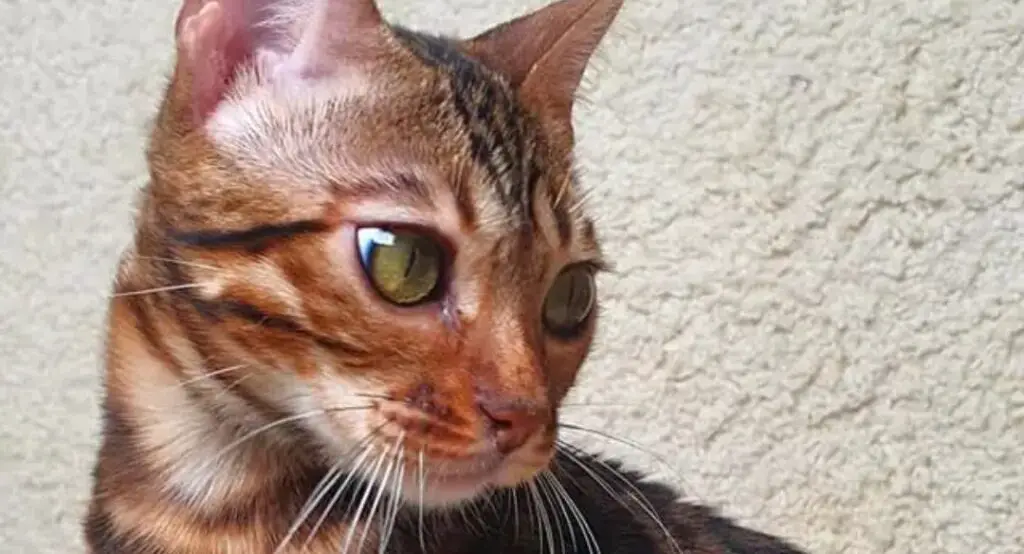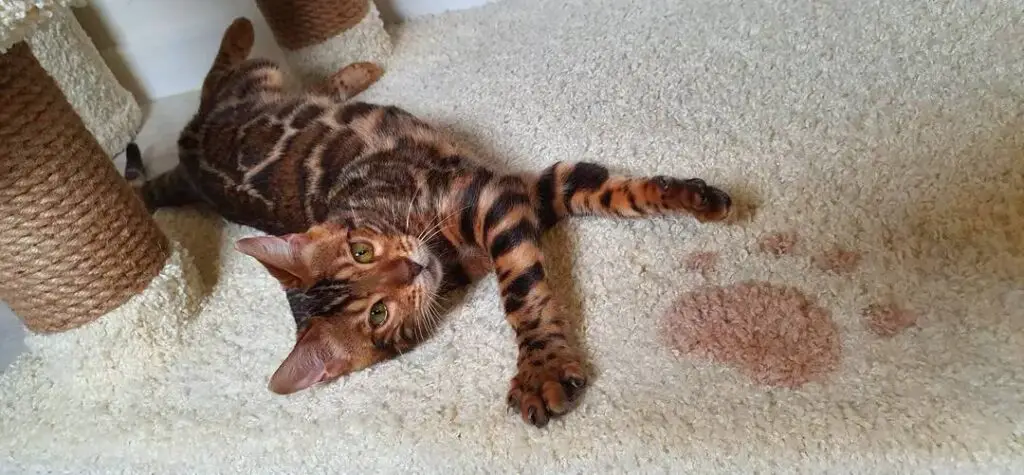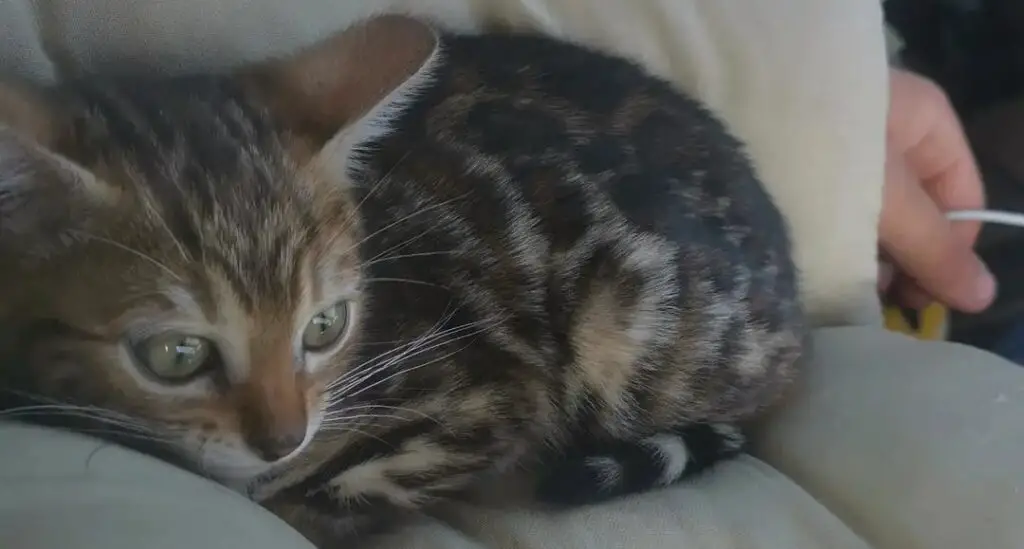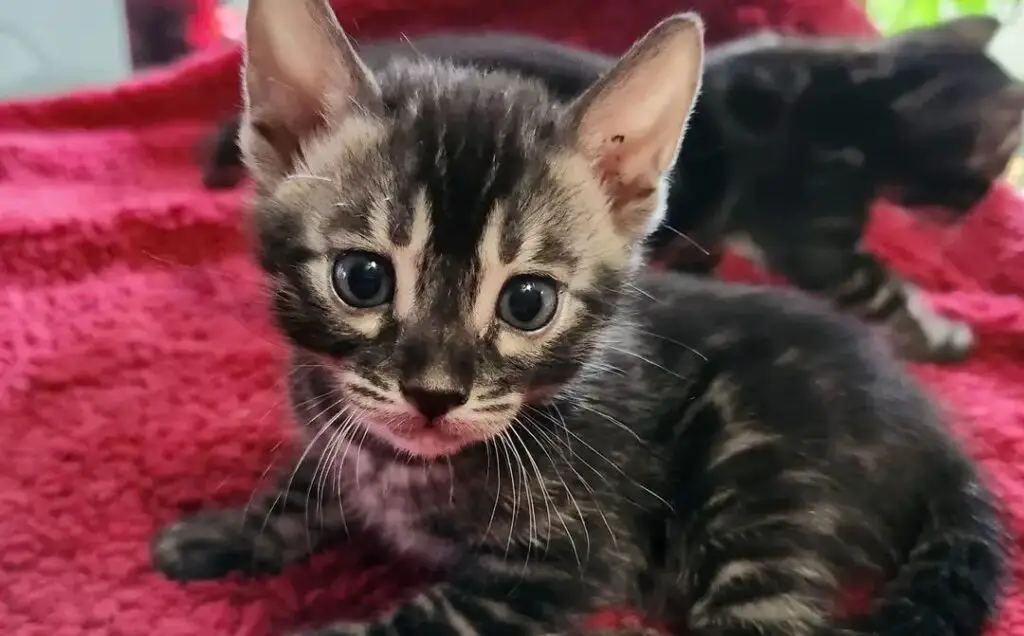Trust me when I tell you that I understand how difficult it can be for your cat to keep you awake at night when you should be sleeping.
There are a lot of reasons your Bengal cat is crying at night, and that is what I will be discussing in this post.
Bengal cats are very vocal and when they cry or whine at night it is difficult for anyone to sleep around them.
That being said, let’s take a look at why your Bengal cat might be crying at night…
Why Does My Bengal Cat Cry At Night
Your Bengal cat may cry at night due to various reasons such as boredom, separation anxiety, loneliness, the need to use the potty area, the need for attention and playtime, or medical conditions like thyroid or kidney disease.
Providing your Bengal cat with stimulating toys, and regular play sessions, and ensuring they have enough opportunities to expend energy during the day can also help reduce nighttime meowing.
For a better understanding, let’s break it down further…
Reasons Your Bengal Cat is Crying at Night

Based on my experience with cats at night and why they cry, here are some of what I consider why your Bengal cat is crying at night:
1. Need to pee or potty
If your Bengal cat is crying at night, one possible reason based on my experience with cats could be that they need to relieve themselves.
Bengal cats are naturally clean animals and prefer to have a designated area for their bathroom needs.
If your cat doesn’t have access to a litter box or if the litter box is dirty, they may cry to get your attention.
To identify this issue, I suggest you should pay attention to your cat’s behavior during the day. If they use the litter box regularly and only cry at night, it’s likely that they need to pee or potty.
To address this issue, You should make sure your Bengal cat has easy access to a clean litter box at all times.
You should always place it in a quiet and secluded area where they can have some privacy, and be sure to scoop the litter box daily and change the litter regularly.
Additionally, you should also consider providing multiple litter boxes if you have a large house or multiple floors.
2. Abrupt change in sleeping routine
From the little I know about Bengal cats, I can tell you that Bengal cats are creatures of habit, and any sudden change in their routine can cause stress or anxiety.
If your Bengal cat is crying at night, it could be because their sleeping routine has been disrupted.
This could be due to a change in your schedule, a new family member, or even rearranging furniture.
To identify this issue, think about any recent changes in your household that might have affected your cat’s sleeping routine.
To address this issue, try to establish a consistent sleep schedule for your Bengal cat.
Always keep in mind that Bengal cats thrive on routine, so you should make sure they have a quiet and comfortable sleeping area.
You should try to avoid any disruptions during their sleep, such as loud noises or bright lights.
Finally, you should try to provide them with a cozy bed or blanket where they feel safe and secure.
3. Need for attention and playtime
Bengal cats are known for their high energy levels and playful nature.
If your Bengal cat is crying at night, they might be seeking attention or playtime.
As most Bengal cats are naturally more active during the night, and if they are not getting enough mental and physical stimulation during the day, they may become restless at night.
To identify this issue, you should observe your Bengal cat’s behavior during the day. If they seem bored or disinterested, it’s possible that they are crying at night because they need attention and playtime.
To address this issue, I strongly recommend you set aside dedicated playtime with your Bengal cat during the day.
You should engage them in interactive games, provide toys that stimulate their hunting instincts, and create a stimulating environment with scratching posts and climbing trees.
This will help tire them out and keep them mentally and physically stimulated, reducing their need for attention at night.
4. Feeling trapped or confined

Bengal cats are independent animals and value their freedom, if your Bengal cat is crying at night, they may feel trapped or confined in a certain area.
This could be due to closed doors, locked windows, or even being confined to a small room or crate.
To identify this issue, you should check if there are any physical barriers that might be limiting your Bengal cat’s movement or access to certain areas of the house.
To address this issue, you should ensure that your Bengal cat has freedom of movement throughout the house, especially during the night.
Keep doors and windows open if it’s safe to do so, or provide them with a designated area where they can roam freely.
You should also try creating a cat-friendly environment with perches and hiding spots will also help alleviate any feelings of being trapped or confined.
5. Boredom/Loneliness
Just like we humans, Bengal cats can also get bored or lonely, especially during the night when the house is quiet.
If your Bengal cat is crying at night, it could be a sign that they need some entertainment and companionship.
To identify this issue, you should observe your Bengal cat’s behavior during the day. If they seem disinterested in their toys or lack interaction with you or other pets, they might be feeling bored or lonely.
To address this issue, I strongly recommend you should provide your Bengal cat with interactive toys and puzzles that can keep them mentally stimulated.
You should also spend quality playtime with them during the evening to tire them out before bedtime.
I advise you should consider getting them a feline companion if you have the means and resources to do so.
Having another cat to play and socialize with can help alleviate their loneliness.
6. Separation anxiety
Most Bengal cats can experience separation anxiety, particularly if they are used to having constant company or if there have been recent changes in their environment, such as a new family member or a change in routine.
To identify this issue, you should pay attention to your cat’s behavior when you are about to leave or when they are left alone.
If they show signs of distress, such as excessive meowing, pacing, or destructive behavior, they might be experiencing separation anxiety.
To address this issue, you should consider creating a soothing and secure environment for your Bengal cat.
You should leave behind familiar scents, such as your clothing or a blanket with your scent, to provide comfort.
I also suggest you should consider using pheromone diffusers or sprays that can help calm their anxiety.
Gradually acclimate them to being alone by leaving them alone for short periods and gradually increasing the duration.
You should also consider providing your Bengal cat with engaging toys or puzzle feeders to keep them occupied while you are away.
7. Need for food or water
If your Bengal cat is crying at night, it could be a simple matter of hunger or thirst.
Bengal cats have smaller stomachs, and they may need to eat more frequently.
To identify this issue, you should assess your cat’s feeding schedule and the availability of food and water during the night.
If they finish their dinner early and have to wait until morning for their next meal, they may cry for food.
To address this issue, you should consider feeding your Bengal cat a late-night snack to ensure they have enough sustenance throughout the night.
Also, you should provide fresh water in easily accessible locations for your Bengal cat at all times.
You should also consider getting an automated feeder that can dispense small portions of food at scheduled intervals during the night.
8. Environmental factors

According to some of my friends who own Bengal cats, they said environmental factors, such as temperature, noise, or light, can also contribute to your Bengal cat’s nighttime cries.
Bengal cats are sensitive to their surroundings, and any discomfort can disturb their sleep.
To identify this issue, you should assess the environment in which your cat sleeps. Check for drafts, excessive noise, or bright lights that might be disrupting their sleep.
To address this issue, you should create a comfortable sleeping area for your Bengal cat.
You should also ensure that the temperature is moderate, and there are no drafts.
You can also use curtains or blinds to block out excessive light at night.
You should also provide a cozy bed or blanket in a quiet and secluded spot where they can have uninterrupted sleep.
I suggest you consider using white noise machines or soothing music to drown out any disruptive noises.
9. Cognitive dysfunction syndrome (CDS)
Cognitive dysfunction syndrome, also known as feline dementia, can occur in older Bengal cats.
If your cat is crying at night and showing signs of confusion or disorientation during the day, it could be a symptom of CDS.
To identify this issue, observe your cat’s behavior for any signs of cognitive decline.
These may include increased confusion, decreased interest in their surroundings, altered sleep patterns, and difficulty recognizing familiar people or objects.
To address this issue, you should provide your Bengal cat with a safe and stimulating environment.
I advise you to create a consistent routine to help them feel more secure, and be sure to use interactive toys or puzzles to keep their mind engaged.
Be sure to consult with your veterinarian for possible medication or supplements that can help manage the symptoms of CDS.
Related: Bengal cat sleeping habits.
10. Pain or Illness
If your Bengal cat is crying at night and displaying other signs of discomfort, such as decreased appetite, lethargy, or changes in litter box habits, they could be experiencing pain or illness.
To identify this issue, be sure to closely monitor your cat’s behavior and look for any changes in their overall well-being.
If you notice any unusual symptoms or if the crying persists, it’s important to consult with your veterinarian for a thorough examination.
To address this issue, it’s vital to address the underlying cause of your cat’s pain or illness.
You should always follow your veterinarian’s advice for treatment, which may include medications, dietary changes, or additional tests.
Be sure to provide your Bengal cat with a comfortable and quiet sleeping area to help them rest and recover.
Offer them extra care, love, and attention during this time to provide comfort and support.
Read more about keeping your cat healthy.
What to do if your Bengal cat is crying at night

If your Bengal cat is crying at night, it could be a sign of distress or boredom.
First, make sure their basic needs are met by providing fresh water, food, and a clean litter box.
Then, check if they have enough mental and physical stimulation during the day, such as interactive toys or playtime.
If the crying persists, consider a visit to the vet to rule out any underlying health issues.
Finally, creating a calm and comforting environment with a cozy bed or soothing music might help your Bengal cat feel more secure and relaxed at night.
Related: Getting your Bengal cat to sleep at night.
Final Thoughts
In summary, if your Bengal cat is crying at night, it could be due to various reasons such as hunger, boredom, or seeking attention.
Addressing their needs by providing a proper feeding schedule, engaging them in stimulating activities, and ensuring they receive enough attention during the day can help alleviate their nighttime cries.
So, listen to their meows and find ways to make their nights peaceful and purrfect!
Related Questions
Why does my Bengal cat cry at night?
Bengal cats may cry at night due to various reasons, such as feeling hungry, seeking attention, or experiencing boredom. It’s important to assess their feeding schedule, engage them in stimulating activities, and ensure they receive enough interaction during the day to address their needs.
How can I determine if my Bengal cat is crying out of hunger?
If your Bengal cat cries at night, check their feeding schedule to ensure they are receiving enough food throughout the day. Consider dividing their meals into smaller portions or providing a snack before bedtime to help satisfy their hunger and reduce nighttime cries.
What can I do if my Bengal cat is crying due to boredom?
To alleviate boredom-related crying, provide your Bengal cat with interactive toys, scratching posts, and engaging play sessions during the day. This helps stimulate their mind and tire them out, leading to a more peaceful night’s sleep.
Is there anything I should avoid doing when my Bengal cat cries at night?
It’s important not to reinforce crying behavior by giving in to their demands immediately. Instead, try to identify the underlying cause and address it accordingly. Creating a consistent nighttime routine and providing a comfortable sleeping environment can also help reduce nighttime cries.









